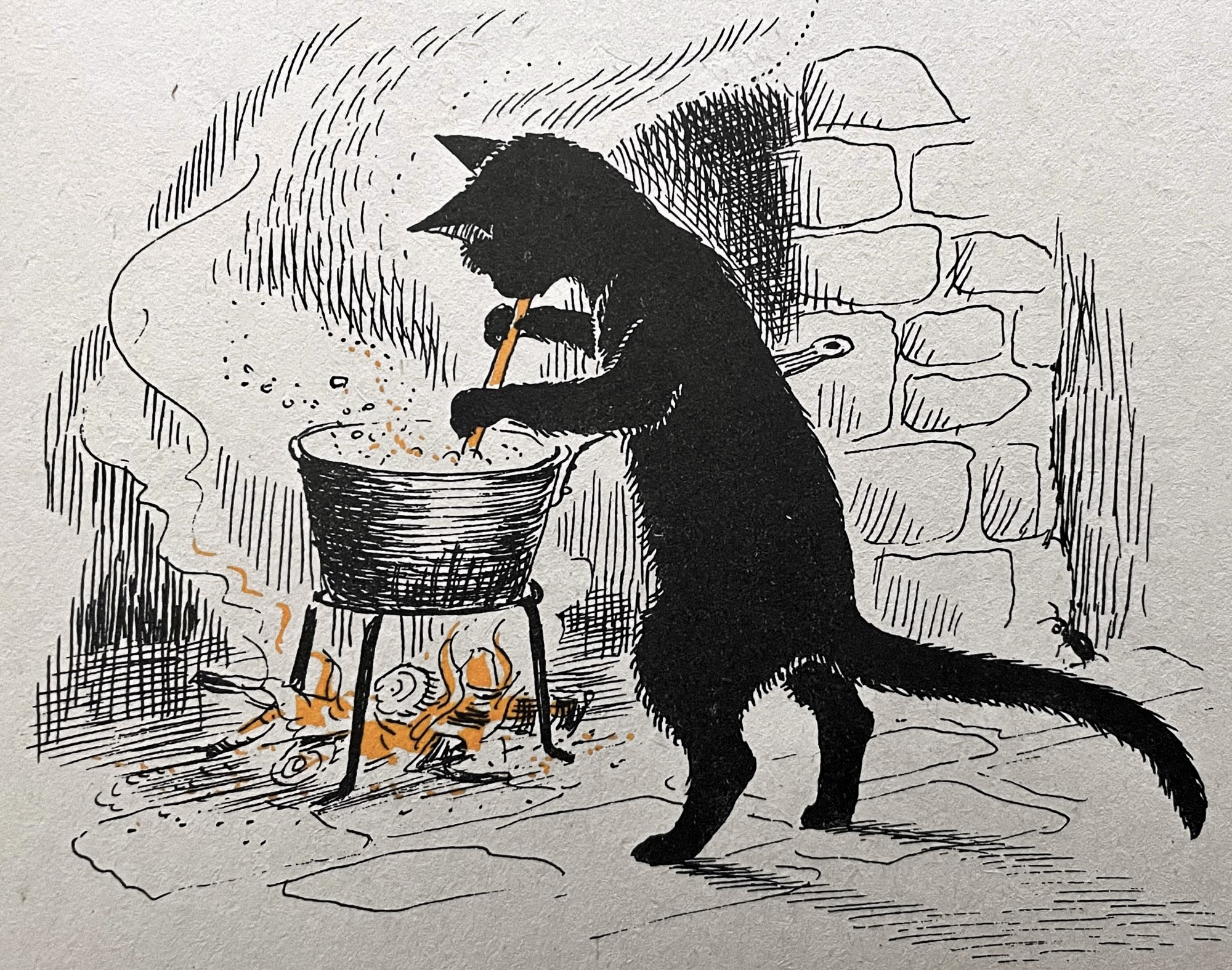
Hey 2023 you,
I know that 2023 has been a tumultuous year, albeit a lot of things happened. You planned out steps by steps what needs to be done in ‘24. You worried about maintaining friendship by hosting functions, meeting new people. Rest assured, we have kept up the tradition writing a “year-review” similar to previous years.
tl/dr: You achieve most of the things you set out to do for last year, with the main theme of “being-there”. Lemme tell you the lore of twenty four.
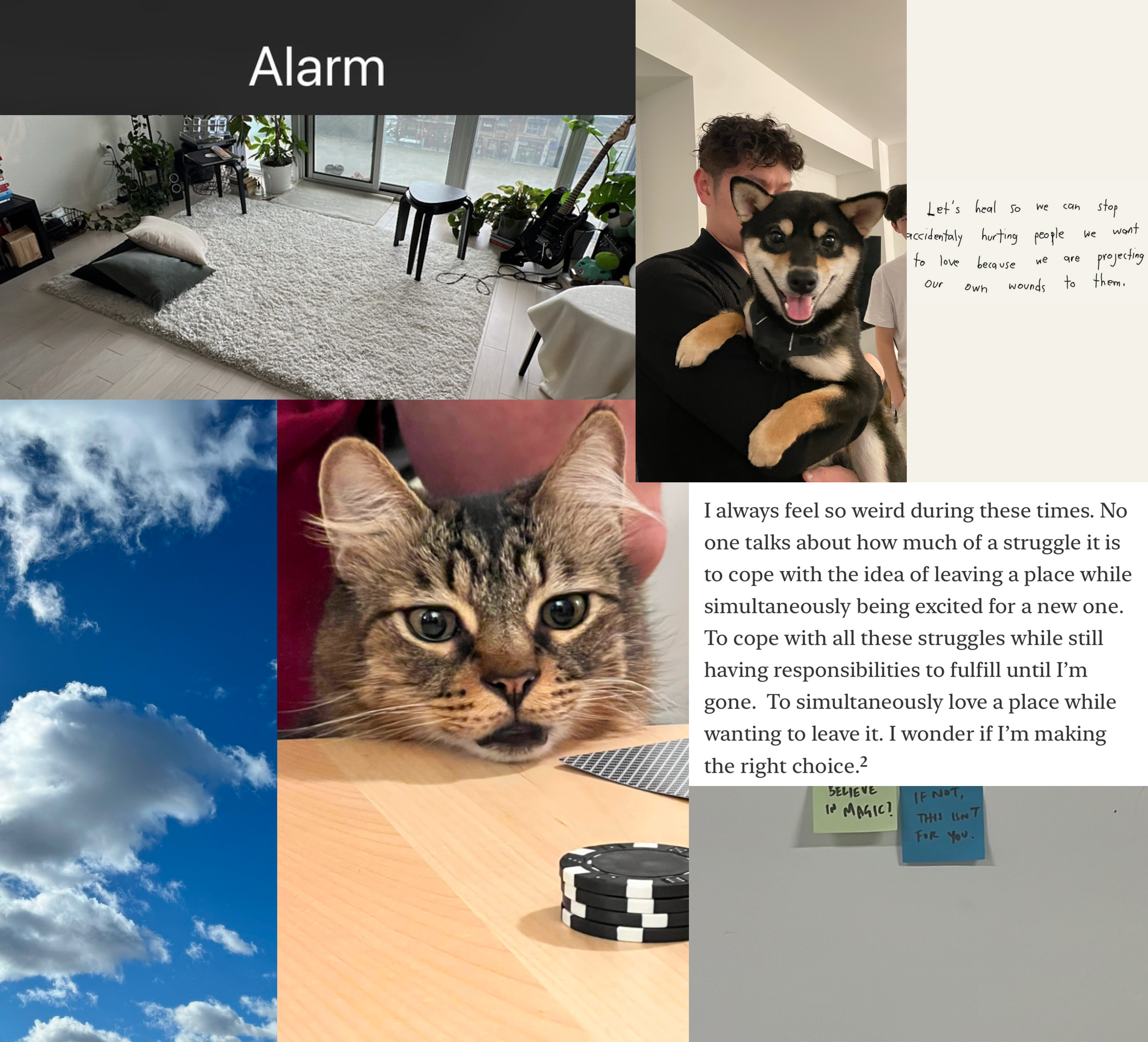
Heidegger’s Dasein underscores that we are beings in the world, with others—searching for meaning. Dasein exists in relations to other being, as the “essence of Dasein lies within its existence.” We wake up each day, startled by own own presence. We spend our nights harboring dreams that might startle us awake.
But what does it mean to truly be there in an age when “there” has become everywhere and nowhere? When presence splits between pixels and flesh, between midnight texts and morning coffee?
You think about this often: how we inhabit spaces that aren’t spaces, how we find ourselves in the gaps between digital signals and analog hearts.
Like ships in fog, feeling our way through the digital murk. The kind of fog that makes you doubt your instruments, that turns familiar harbors strange. You send signals out into the void - a tweet here, a reply there - never sure if they’ll reach anything solid. Most bounce back empty. But sometimes, rarely, you hear an answering horn. Clear and true, cutting through the static.
That’s how T and I found each other. Two vessels, running different courses but somehow on the same frequency. At first, just blips on each other’s radar. “T from Twitter,” I’d think, as if that digital marker could contain a person. Like how sailors must have once navigated by stars they’d named but never touched.
Strange how you can sense authenticity even through the fog. It’s in the way someone signals back - not the polished ping of social media performance, but something rougher, realer. The maritime equivalent of someone speaking in their real voice after hours of small talk. You recognise it instantly, even if you’ve never heard it before. The fog never really lifts in this city. It just thins sometimes, enough to see the shape of things. Enough to find your way to a coffee shop where someone you met through screens becomes flesh and blood, becomes real in a way that surprises you both. The digital distance collapses, and suddenly you’re in clear waters, talking like old friends who’ve finally found their way home.
We’re both busy, but we find these pockets of time. The conversations pick up like they never paused. Walking through Toronto’s glass canyons one day, T said something that stuck:
Your life so far is a drawing canvas. You can’t change what’s already been drawn, but you can always paint a new line. — Tommy
That’s how it goes these days. You put yourself out there in bits and bytes, then occasionally, it reciprocates.
I went to T’s co-working hours, a ritual space to chase our unfinished dreams. Went to high school friend parties too. Smiled until my face ached. They call it networking, but really it’s just people trying not to be alone. You start to recognise the driven ones - they move differently, go-getters vibe, like they know time is running out.
Your birthday came around. We flinched. Birthday felt like accusations, after a certain age - each candle a small indictment of time spent, reminder of the absurdity of life. They’re timestamps forcing us to acknowledge another year gone, marking the slow erosion of possibility into memory. Most years, I’d dodge the day entirely, treat it like any other Thursday.
Yet, this one felt, full, somehow. Not the fullness of a good meal or watching lovers in High Park on a June afternoon, their shadows long and tender on the grass. Not even the fullness of achievement or acquisition. This was the kind of fullness Montaigne wrote about, when he couldn’t explain why he loved his friend except to say “Because it was him, because it was me.” The kind that comes from being known, really known, in all your jagged edges and soft spots.
They showed up at your usual spot - N in her cream vest catching light, S fresh from a capstone meeting, M bringing that energy that fills rooms. Nobody was performing. Nobody was trying to network or optimise or leverage the moment. They were just there, present in that rare way that makes you feel like you exist more solidly in the world. You know how sometimes a friend’s gaze can make you feel more real? It was like that, multiplied.
We talked about nothing important. Failed projects. Post grad. Plans. Dreams. The way the city changes you when you’re not looking. The conversation flowed like water finding its level, natural and unforced. No one checked their phone. No one had somewhere better to be. In a world of constant motion, of endless “sorry, been swamped, let’s catch up soon,” here was an island of stillness. Of attention freely given.
Later, walking home through streets gone quiet, I thought about how vulnerability makes us more resilient. How opening yourself to desire and attachment, accepting the love you feel and permitting yourself to receive the love you’re given, builds a kind of strength. Maybe that’s what made this birthday different. Not the number of people around the table, but the depth of the seeing. The willingness to be seen.
I used to think getting older meant accumulating armor. Now I wonder if it’s about learning when to let it fall.
Someone once called me a cactus. Thorny exterior, life-giving inside. The kind that survives in harsh conditions, holding water for seasons unseen. Like how certain plants thrive in unlikely places, certain connections bloom in unexpected ways.
Maybe that’s true. Maybe that’s why you decided to cook for twenty people at the Orangeville retreat. Not because it made sense - it didn’t - but because something in you recognised something in them. Not just people, as the old advice goes, but differently free people. Each one moving through the world in ways you couldn’t predict, carrying stories you couldn’t write.
The kitchen became an assembly line of chaos. Pasta station, prep station, voices calling for more salt, more time, more everything. Steam rising like prayers to forgotten gods. V and C cutting vegetables. You were on pasta duties. F was on photos duties. K telling stories between stirring the sauce. Nf arranging plates like she was painting with food. Each person bringing their own rhythm to the dance.
That night, attention flowed like wine. In the way Nf noticed when the garlic was about to burn. How W remembered everyone’s dietary restrictions without being reminded. The small kindnesses that make a meal more than just fuel. To feed people is to practice a particular kind of attention. You have to notice things: the slight tension in shoulders that means someone’s had a rough day, the empty plate that speaks of hunger beyond food, the way conversation rises and falls like breath. You have to be present in a way that social media and scheduled meetings never demand.
Next year, I’ll try again. Smaller scale. Ten people, maybe twelve. Not because twenty was too many, but because some things need more space to unfold. Sometimes, you have to start big to learn how to be small. To understand, as Rao might say, that freedom isn’t about capacity but about seeing reality without sentiment and acting with appropriate force.
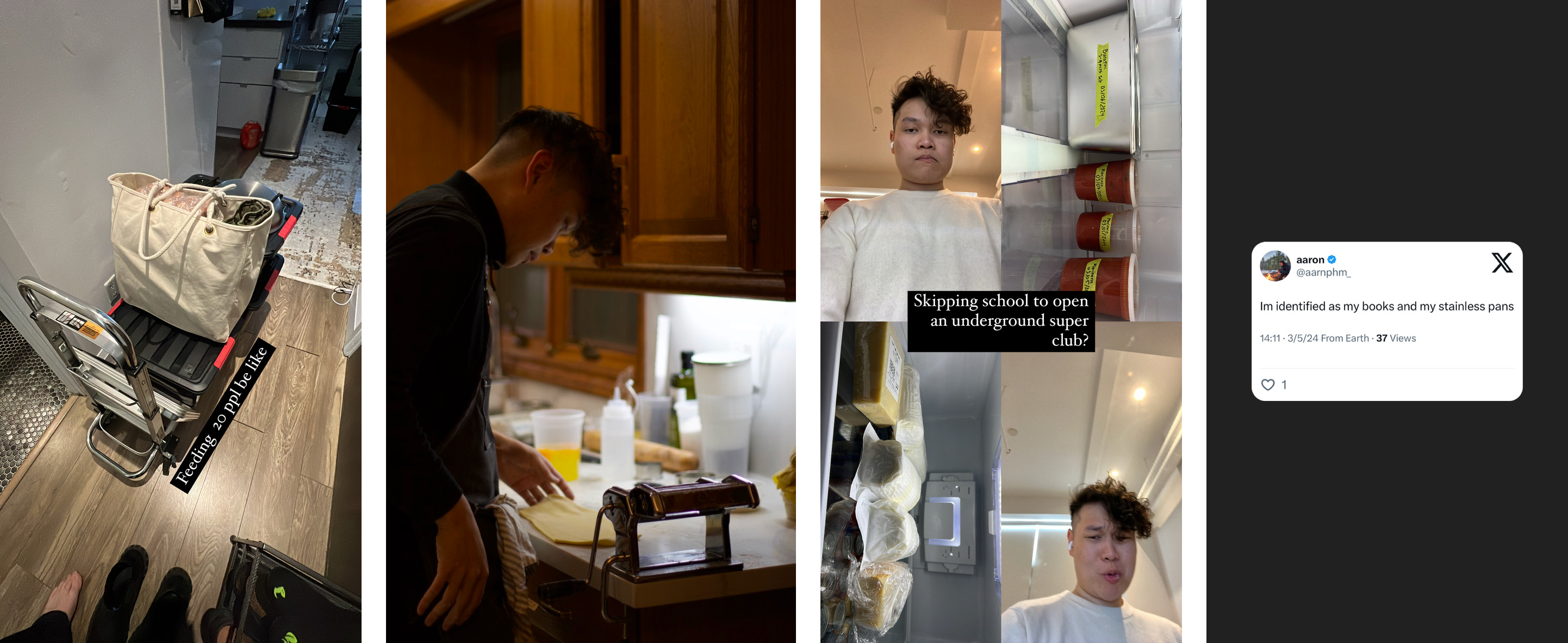
In the end, everyone helped clean up. No one had to ask. Like a flock of birds turning in perfect synchronisation, we moved around each other in the kitchen’s tight space, putting things right. Someone hummed. Someone else joined in. The night settled around us like a blanket.
That’s the thing about being a cactus. You learn to store these moments, these oases of connection, for the dry seasons ahead. You learn that thorns aren’t just for protection - they’re also for gathering dew, for catching the light in unexpected ways.
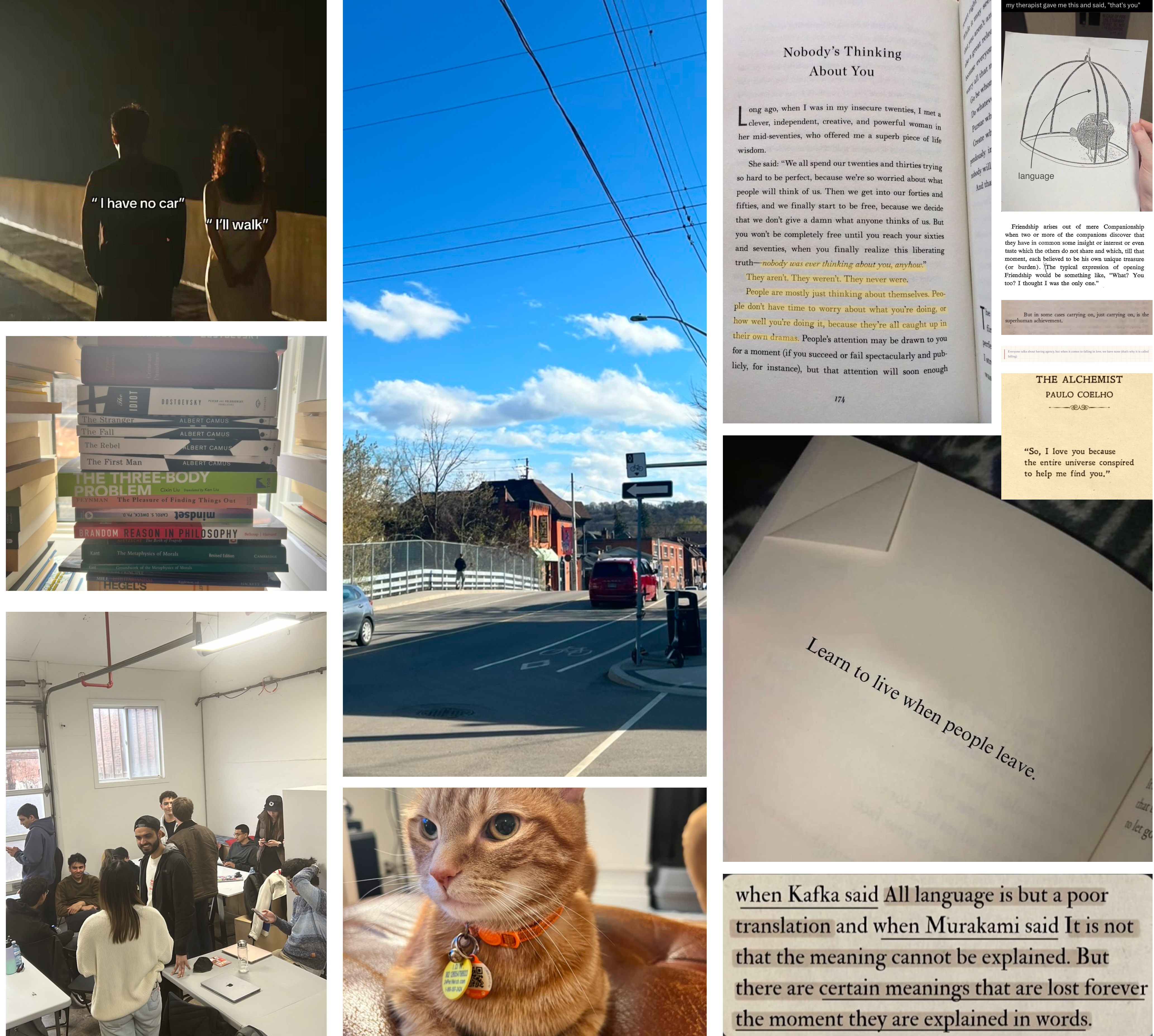
Authentic Being is its own measure, in other words when it does not have to justify it's existence as compared with anything else. -- Heidegger, B&T
The June air hung still in Hamilton, thick with absentee, pressing against my skin like a mere asseveration. Each morning I wake to find the city has transformed into something both familiar and grotesquely foreign. Bird calls pierce the everlasting silence, as if nature itself has become an elaborate joke at my expense. The houses stand empty, their windows dark and judgmental, their inhabitants fled to summer cottages and coastal retreats. I tell myself I’ve chosen to stay, muttering about stability and the virtue of mundane experience like a man trying to convince himself of his own sanity. But in truth, I’ve become both the prisoner and the warden of my own isolation. The streets stretch out before me like the passages of a labyrinth I’ve designed myself, yet somehow cannot escape. Even my shadow seems to follow a few steps behind, as if unsure whether to keep me company.
K and I reconnect sporadically through screens and occasional New Office Hour, our friendship the kind Ava wrote about—minimum viable, sustained through authentic moments rather than constant contact. We orbit each other from afar, catching glimpses through social media, our conversations picking up right where it left.
The existential weight of friends graduating, moving away, settles like dust on everything. They leave one by one. A lunch, a hug, promises to keep in touch—the familiar choreography of loss. At work, I perform competence with mechanical efficiency. My calendar fills with meetings I attend in body only, my mind elsewhere, calculating the growing distance between here and everywhere else. I find myself failing to show up for meetings, the passion that once drove me now flickering like a candle running low on oxygen.
Jung wrote about the shadow—those parts of ourselves we prefer not to see. Mine lives in browser tabs: flight prices to NYC, London, Cancun; ML papers I haven’t read; messages I haven’t answered. The cognitive dissonance hums beneath every action, unfolding step by step. I track it like I track my GitHub contributions: green squares of productivity that correlate inversely with hours of sleep. At 2 AM, I catch myself with sixteen browser tabs open—four documentation pages, three ML papers, six apartment listings in different cities, two flight searches, and somehow, inevitably, a tab about burnout. Each tab is a thread pulling in opposite directions, and I’ve become skilled at holding the tension without resolving it. Your Strava shows longer runs, not because I’m training for anything, but because I’m running away from something I can’t name. My calendar is a perfect grid of meetings and deadlines, while my Notes app fills with half-written resignation letters. The body keeps score: caffeine intake up 800%, sleep quality down 60%, productivity maintaining at an unsustainable line.
The ML industry doesn’t wait for resolution. Each week brings new papers, new benchmarks, new proofs of my increasing obsolescence. I tell myself I’m being strategic, staying informed, but really I’m watching the future arrive like waves, each one making me feel smaller than the last. The anxiety isn’t in the failures—those I could face. It’s in the achievements that feel like accidents, the successes that seem to belong to someone else. Star repositories, approved PRs, deployment metrics—perfect pebbles collected from a beach I no longer want to visit. My shadow self kicks sand over them, laughing.
The truth is simpler and harder: I’m afraid of becoming obsolete 1, fully knowing that I have acquire enough engineering fluency to prove otherwise. Every time I open Twitter, someone younger has built something better. Every time I close it, I’ve lost another hour I could have spent building. The dissonance isn’t between what I do and what I say—it’s between what I am and what I think I should be. At 3 AM, debugging someone else’s code, I wonder if this is what Jung meant by individuation: learning to hold these contradictions without breaking.
SS notices—they’re understanding, thankfully. But understanding doesn’t fill the spaces left by departed friends, doesn’t answer the question that haunts me: why am I still here in Hamilton? Why not Toronto? NYC? I run. Cook. Meet KS and Ki at bars (they work there, awesome human being). Build routines like walls against loneliness. But you can’t dam an ocean with clay. Eventually, everything leaks through.
One day, everything stops. Not dramatically, but in the way summer heat can suddenly make you aware of your own breathing. I let myself feel it all. Cry, actually, a lot. There’s something Heideggerian about it—this raw being-in-the-world, this Dasein moment of confronting one’s own existence without pretense. It’s not just about missing people. It’s about recognizing that sometimes the only way forward is through. Through the feelings, through the uncertainty, through the knowledge that you can’t go home again because home—like everything else—has already changed.
The bird calls still echo. But now they sound less like absence and more like presence. My presence, here, choosing to stay, choosing to feel, choosing to be.
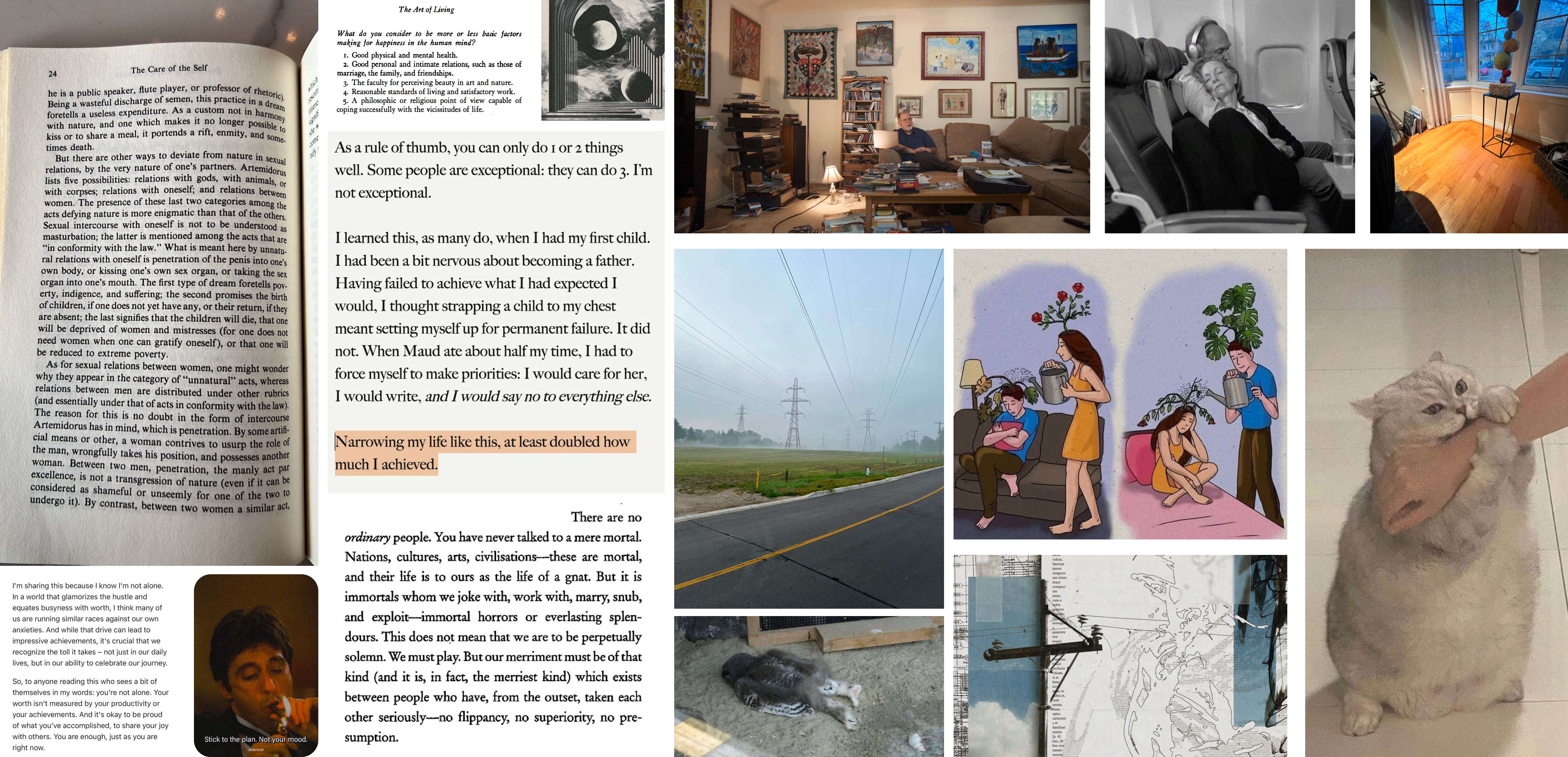
I run at dawn now. The Canadian mornings carry a particular chill that takes me back to San Francisco nights with J. The way memory works: a temperature, a certain slant of light, and suddenly you’re transported. Not to the person exactly, but to the shape they left behind.
The ghost of J appears in strange moments. Like how I still instinctively reach for my phone at 10 PM, the time we used to talk. Or how I order coffee for two before catching myself. Freud would call these slips revelatory, tiny betrayals of the unconscious mind still processing loss. Not just of J, but of what J represented: certainty, future, home.
The market of human connection operates on scarcity and substitution. When we lose something valuable, we seek replacements - not perfect substitutes, but approximations that might fill the same shape. It’s basic economics of the heart. Yet every replacement carries its own opportunity cost. Each new connection risks comparison to what was lost.
I find myself performing cost-benefit analyses of vulnerability. Opening up to N feels different - there’s no sunk cost fallacy here, no emotional debt to repay. But there’s also this nagging awareness that I might be responding to market forces rather than genuine desire. Am I attracted to her, or to the idea of not being alone?
The truth is messier than both Freud and Friedman would admit. Sometimes a void isn’t meant to be filled. Sometimes it’s meant to be witnessed, acknowledged, allowed to exist as its own kind of space. N isn’t a replacement for J. She’s something entirely new, operating under different rules of exchange.
Yet these Freudian slips persist - calling her by J’s name in my head, catching myself planning futures I have no right to imagine. The unconscious mind, ever the poor economist, trying to maximize returns on emotional investment through familiar patterns. But N deserves better than to be a hedge against loneliness. She deserves to be seen for who she is, not for the absence she might fill.
When you got the job, your excitement burst through the screen unfiltered, unapologetic. There’s something beautiful about watching someone you care about embrace joy without reservation. We celebrated a few nights after- you in your chic leather pants that caught the restaurant lights just so, wearing a perfume that reminded me of oak and coming home. I’ve read somewhere that certain people have this gift of turning ordinary evenings into core memories. You have that gift. You take mundane moments - a dinner, a laugh over wine, a shared glance - and somehow make them feel like photographs I want to keep forever.
There’s something about N I can’t quite name. It sits still in that undefined space between friendship and something else - like a word caught at the tip of your tongue. We’ve developed our own grammar of care: photos I found randomly on Reddit, that wig N wore for Halloween, dating stories, shared silences that feel like conversations, a gentle smile across the hall. Each one a small testament to thinking of each other in the midst of separate lives. Sometimes you would come across something - a particular piece of code, an elegant proof - and your first thought is how N would see it differently.
The ancient philosophers argued about whether eudaimonia required external goods or if virtue alone was sufficient. With N, I’m learning it might be about something else entirely: the quiet accumulation of shared understanding, the slow building of trust through consistent presence. Not the dramatic peaks of romantic love, but something steadier - a continuous choosing to remain in each other’s orbit.
Sometimes I wonder if this is what Epicurus meant by sustainable pleasure - not the fleeting high of desire, but the deeper satisfaction of genuine connection. The way she remembers small details about my life, how she’ll reference conversations from months ago as if they just happened. These aren’t the katastematic pleasures Epicurus described, but they create a similar sense of completeness, of being exactly where you’re meant to be.
Yet there’s an edge to this undefined space we inhabit. Like atomic swerve in Epicurean physics - that unexpected deviation that creates new possibilities - I find myself wondering if this careful equilibrium we’ve built might one day shift into something else. Not better or worse, just different. The thought both thrills and terrifies me.
What would Epicurus make of our modern ataraxia? Finding tranquility in looking at each other, peace in the quiet ping of a message arriving.
Similar to Kate Crawford’s study of the atlas of AI alignment, we’re really mapping human connection - trying to understand how minds meet and merge across distance. The technical becomes personal; the personal becomes technical. We send each other papers about attention mechanisms while paying attention to each other’s subtle shifts in mood.
It's a peculiar intimacy, born of our time.
The school term settled into patterns. You negotiated fewer hours with S, not from lack of interest but necessity - school was demanding more of you. You called it “pseudobalance,” though that wasn’t quite right. It was more like redistribution of hunger.
The capstone became your gateway into mechanistic interpretability. At work, you found yourself among the working group, including the likes from Berkeley, RedHat, Anyscale, Neural Magic, etc., on LLM inference engine. The work was technical. But there was something grounding about it all. The mathematics of inference provided its own kind of clarity.
You found yourself caught in this current of constant learning - expanding context windows, diving deeper into transformer architectures, discussing optimization strategies over Zoom that stretched into evening. Not because you had to, but because you wanted to understand. The way a mechanic wants to understand an engine, or a doctor the human body. It wasn’t exactly balance. But it felt authentic - this immersion in technical complexity, this way of being present in the work. Like you were finally operating at the right frequency. The days blurred together. You were becoming something - not better necessarily, just more defined. More precisely yourself.
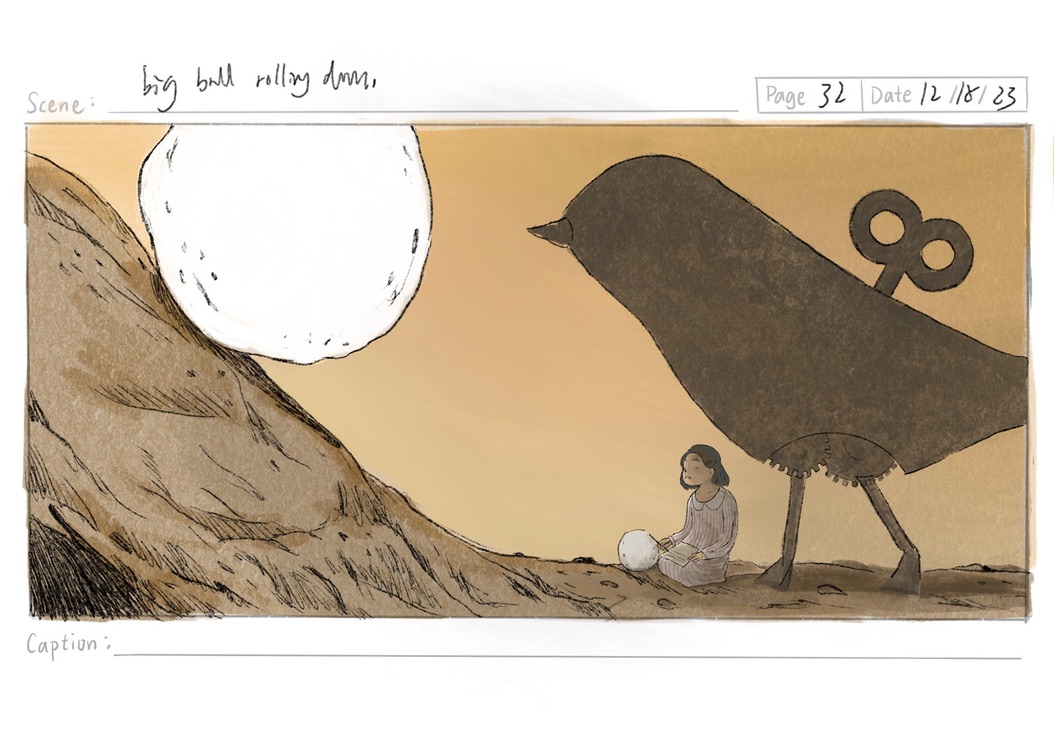
I find myself taking more photos lately. Not the carefully composed kind, just quick captures of ordinary moments - a coffee cup catching morning light, her profile turned away in conversation, shadows stretching long across park benches. It’s not about making memories, exactly. More like leaving breadcrumbs for my future self, proof that these moments existed before time swept them away.
Maybe it’s about learning to see things as they are, not as I wish them to be. The way Carver’s characters stumble towards truth through the debris of their own delusions. The camera doesn’t lie, even when we do. Through its lens, I’m teaching myself to notice: the slight downturn of her mouth when she’s thinking hard, the particular way afternoon sun hits the kitchen wall, how certain silences feel fuller than others.
There’s a kind of surrender in this - accepting that everything changes, that we can’t hold onto anything except these fragmentary glimpses. Yet in the trying, in the paying attention, you will notice your core tenet: real seeing requires both the willingness to look and the courage to let go of what we think we’ll find.
These photos pile up in my phone like fallen leaves. Most I’ll never look at again. But taking them has become its own form of prayer, a way of saying: I was here, I noticed, this mattered.
2024 unfolded like one of those long poems I keep bookmarked - chaotic in its rhythms yet somehow peaceful in its completeness. The paradox sits comfortably now: how the most tumultuous year could bring such stillness. I filled journals not meant for anyone else, letting thoughts spill onto pages without trying to make them presentable. There’s a strange intimacy in writing purely for oneself - no performance, no carefully constructed narrative, just the raw material of a mind trying to understand itself. Looking back feels like leafing through a book where the pages aren’t quite in order, but the story somehow makes more sense that way. Each month brought its own particular shade of uncertainty, yet I moved through them with a steadiness that surprised me.
If you’ve read this far, you’ve witnessed a kind of unfolding I’m still trying to understand. Thank you for that. Not for reading, exactly, but for being present as these thoughts find their shape on the page, as 2024’s version of me learns to exist in full color, without apology.
The year closes like a book with dog-eared pages and coffee stains, messy but well-loved. And isn’t that exactly how it should be?
Regardless, a quick recap of what 2024’s Aaron did/get, an unstructured streams of thoughts:
- I splurged on this bag and to be honest it is the best purchases I made this year. There are something comfortable, yet familiarity I found wearing this bag. It made me feel so grand 😄
- Started capstone, working on vLLM structured decoding (more to come). To be honest, this year I’m very happy that I dive first into these technical topics. Maybe, you can just learn and do things.
- Tend to your garden, I’m pretty happy with the current state of this website. It demonstrate the real me, the inner child that was always too afraid to ask, to talk, simply for the fact of maintaining peace and quiet.
- You made great friends, for life. Just make sure you tend to them, treat them the same way you want to be treated. This year marks the creation of a lot of seeding, next year are important in a sense you should navigate this labyrinth of relationship with care, and self.
- Finished around 18 books this year, definitely happy with the amount of content per book.
- Attend one-of-its-kind hackathon.
Some rituals I would like to keep:
- seeing friends (I’m moving to Toronto soon!)
- be happy. (knowing me, yet keep trying to smile)
Kindly,
your present self
Remarque
-
maybe I would write about this one day from a perspective of an engineer, but found this thread from Chris Olah that captures the essence of what’s happening with the job market ↩